Guppies are one of the most popular and beloved fish among aquarium enthusiasts. They are known for their vibrant colors, playful nature, and ease of care. However, it can be distressing to find your guppies dying for no apparent reason. In this blog post, we will explore some common reasons why guppies may be dying and what you can do to prevent it.
1. Poor Water Quality
One of the leading causes of guppy deaths is poor water quality. Guppies are highly sensitive to changes in water parameters, such as temperature, pH, ammonia, nitrite, and nitrate levels. If these parameters are not within the appropriate range, it can stress and weaken the fish, making them more susceptible to diseases.
To ensure good water quality, regularly test the water parameters using a reliable testing kit. Maintain the temperature between 75-82°F (24-28°C) and the pH between 6.8-7.8. Keep ammonia and nitrite levels at 0 ppm and nitrate levels below 20 ppm. Perform regular water changes to remove accumulated toxins and maintain a healthy aquarium environment.
Credit: www.fishlore.com
2. Overcrowding
Guppies are active swimmers and need plenty of space to thrive. Overcrowding the tank can lead to stress, aggression, and the spread of diseases. As a general rule, provide at least 1 gallon (3.8 liters) of water per guppy. If you notice that your guppies are exhibiting signs of stress, such as hiding, fin nipping, or decreased appetite, it may be a sign that the tank is overcrowded.
Consider upgrading to a larger tank or reducing the number of guppies in the tank to provide a more suitable environment for your fish. Providing hiding spots and plants can also help create territories and reduce aggression among guppies.

Credit: www.reddit.com
3. Poor Diet
Guppies are omnivorous and require a balanced diet to stay healthy. Feeding them a poor-quality diet or only one type of food can lead to malnutrition and weakened immune systems, making them more susceptible to diseases.
Offer a variety of high-quality foods, such as flake food, pellets, frozen or live foods like brine shrimp and daphnia. This will ensure that your guppies receive all the necessary nutrients for their overall well-being. Remember to feed them in small portions multiple times a day to avoid overfeeding and keep the water clean.
4. Disease and Parasites
Guppies are prone to various diseases and parasites, such as ich, fin rot, velvet, and parasites like gill flukes and anchor worms. These can cause symptoms like lethargy, loss of appetite, abnormal swimming behavior, and visible signs of infection.
Quarantine new fish before introducing them to the main tank to prevent the spread of diseases. Maintain good water quality, provide a balanced diet, and avoid overcrowding to keep your guppies’ immune systems strong. If you notice any signs of illness, promptly isolate the affected fish and treat them with appropriate medications.
5. Stress and Poor Acclimation
Guppies are sensitive to sudden changes in their environment. Poor acclimation when introducing new fish or making drastic changes to the tank can stress your guppies and lead to illness or death.
When adding new fish to the tank, float the bag in the aquarium for about 15-20 minutes to allow the temperature to equalize. Then, gradually add small amounts of tank water to the bag every 10-15 minutes to acclimate the fish to the new water parameters. This process should take approximately 1-2 hours.
When making changes to the tank, such as rearranging decorations or adding new equipment, do so gradually to minimize stress on the fish. Maintain a stable and consistent environment to promote the overall well-being of your guppies.
Conclusion
Guppies are beautiful and fascinating fish, but they require proper care to thrive in an aquarium. By ensuring good water quality, providing adequate space, offering a balanced diet, preventing diseases, and minimizing stress, you can significantly reduce the risk of guppy deaths. Regular observation, maintenance, and taking prompt action when necessary are key to keeping your guppies happy and healthy.
